|
I am, by and large, not someone who responds to cinematic emotional manipulation, those attempts to raise a lump in the throat through a combination of sad faces and the welling of orchestra strings, a technique Hollywood has employed for decades and rendered ineffective through overuse. I didn't even succumb to the recent The Diving Bell and the Butterfly, a beautifully crafted film whose most powerful heartstring tug involves locked-in-syndrome sufferer Jean-Dominique Bauby being unable to play with his kids, a short-cut to emotional empathy that unfortunately doesn't work so well for someone who prefers children of any age to be kept at a considerable distance.
But every now and then a film manages to push that illogical button in my brain that transforms me unexpectedly into an emotional idiot, and if they can do it on repeated viewings then they've really scored a home run. Those last two notes of Leonard Bernstein's score for West Side Story after the death of Tony – anyone who reacted similarly will know which ones I'm talking about – will always get my bottom lip quivering, as does that crane shot of Claudia Cardinale taking water out to the railway workers to Morricone's super-emotional score at the end of Once Upon a Time in the West. The climactic wallop of Isao Takahata's stunning Hotaru no haka [Grave of the Fireflies] reduced me to a blubbering wreck, something my girlfriend had been so ready for that she had a box of tissues in her hand ready to pass to me just as the gut-wrenching strains of No Place Like Home kicked in. Good grief, I get sniffly just thinking about it.
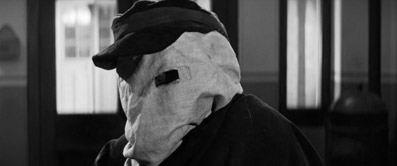
And then there's The Elephant Man. I sat in the cinema as the final shot rolled with tears pouring down my face, something I was curiously reluctant to confess to the friend who had just the day before called me to demand I see it without delay. He made no mention of it at that time, but following my later admission, he confessed that he'd done likewise. The two of us went to see it together a couple of weeks later and were both at it again, two grown men reduced to pretending we'd caught epic colds to excuse why we were blowing so loudly into handkerchiefs as we shuffled out of the cinema, trying to avoid the gazes of those queuing for the next performance.
It's important for newcomers to the film, should there be any, to note that this was not the prime reason for my friend's initial and enthusiastic recommendation and for me it was the most surprising aspect of the second feature from the man who had so successfully burrowed into my nightmares with Eraserhead. That we were so emotionally moved by this extraordinary title character and his fate is crucial to why we became so engrossed in the film, but this was just one of many reasons that we were so smitten by it.
Although I've already credited The Elephant Man as a David Lynch film, I should state up front that this really is the result of the collective effort of a number of hugely talented individuals and three genuine visionaries. That Lynch is one of these is a given – aside from the admiration I have for his extraordinary and individualistic body of work, I genuinely cannot imagine this movie working as perfectly as it does had it been directed by anyone else. But I'll get to that later.
The second of this elite trio is producer Jonathan Sanger. It was Sanger who was instrumental in securing Lynch the director's chair, and not on the basis of his handling of period pieces or emotional dramas but purely on the strength of Eraserhead. Now don't get me wrong, I adore Eraserhead to the point where I can't be remotely reasonable or balanced if it comes up in conversation (it does occasionally, you know), and following its release was telling everyone I could reason with that the man who made it was a genius. But even I would not have seen that as qualification for directing The Elephant Man. Which is, of course, why Jonathan Sanger is producing movies and I am merely basking in their glory.
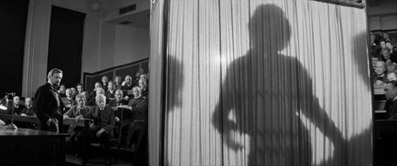
The third visionary, of course, is executive producer Mel Brooks, who having only recently established his own production company, Brookfilms, was about to take an almighty gamble on the first non-comedic film to be made under its banner. He and Sanger did everything that other established industry figures would tell you was wrong for such a venture – they chose a script that no studio wanted, a director whose only previous feature was an art-house cult, cast the film almost exclusively with British talent selected for their acting skills rather than their box-office appeal, and they let Lynch do the unthinkable for the time and shoot the whole thing in black-and-white. Like I said, these men were visionaries.
If, by some chance, you were previously unaware of the film or the true story behind it, then a little background is in order. The film does take some small liberties with the facts of the case and the timeline of particular incidents, but no matter – since it's the film that's under discussion we'll go with that version.
In Victorian London, respected surgeon Dr. Frederick Treves becomes intrigued by a fairground exhibit known as the Elephant Man, but before he can investigate further the show is closed down by the police to the loud protestations of sideshow barker Bytes. Returning to his work at the Royal London Hospital, Treves engages the help of a young and trustworthy associate to locate Bytes, whom he pays for a private viewing and is shown a man named John Merrick, whose extensive deformity leaves the doctor stunned. He persuades Bytes to send Merrick to the London Hospital, where his attempts to question him prompt no legible response, but secures his silent agreement to present him and his condition to the London Pathological Society. After taking a beating from the drunken Bytes, Merrick is hospitalised under Treves' personal care and kept in isolation from the other patients. Convinced of Merrick's imbecility, Treves teaches him a few basic phrases in the hope of persuading hospital administrator Carr Gomm that his patient is physically disfigured but mentally alert. Carr Gomm is not fooled for a minute and rules that due to his incurable condition Merrick should be transferred elsewhere, but this most unusual of patients has a surprise for both men.
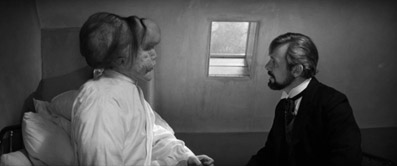
If you really are new to the film and do not want to deal with any spoilers then I'd hop to the end of the review, but I'd also avoid reading anything about it elsewhere and steer clear of the trailer, as subsequent events are revealed almost everywhere you look. Whether they actually act as spoilers is another thing – I'd argue that the film's most effectively handled character surprise loses nothing from knowing that it's on the way. But the warning's been given and it's up to you whether you heed it.
The revelation I'm talking about, as all who have seen the film will know, is that far from being an imbecile, Merrick is both intelligent and well read, his previous silence the result of a fear of vocal communication installed in him by the bullying hand of Bytes. It's a gloriously executed reveal in which hopes are built, dashed and then joyously surpassed in the space of just a couple of minutes, and all the more effective for being delayed for so long. There are many similar instances throughout the film in which narrative, character development, timing, performance and execution are in sublime harmony. The trick is that this harmony is also evident between these showcase moments, in every scene, every beautifully composed frame of the film. Did I mention I'm a bit of a fan?
I don't choose there words lightly: I genuinely cannot think of many films where every element is worthy of such high praise, where each of those components contributes so effectively and equally to the whole and where that whole feels so perfectly formed. Dramatically, it pushes all of the right buttons and yet by the nature of its subject, one that every studio that the filmmakers initially approached rejected, its narrative plays games with convention and expectations. That the extent of Merrick's deformity is initially kept hidden is unsurprising, for example, but our first clear view him, although shocking for the young nurse who has been asked to take food to his room, catches him in a moment of awkward, embarrassed half-nakedness, as alarmed by the reaction of the nurse as she is by him.
A key strength of the narrative is that it is built on such a solid substructure, one that explores Merrick's humanity in a world in which his appearance makes him an eternal showpiece, the subject of fascination for the curious at all levels of society (something that continued even after his death with the preservation of his skeleton and internal organs and the casts made of his face and body). Under Bytes he is a freak show exhibit, but under Treves' care he quickly finds himself being stared at by the similarly startled members of the Pathological Society with Treves as the master showman. The spectre of Bytes returns in the shape of the hospital's night porter, a cruel opportunist who charges pub locals for a peek at the Elephant Man and subjects Merrick to physical humiliation. Later, as Merrick is embraced by London's social elite after he is befriended by influential actress Mrs. Kendal, he again finds himself on display, granting audiences to the shallow wealthy so that they may brag to their peers at having met with him, even if the experience of doing so repells them.
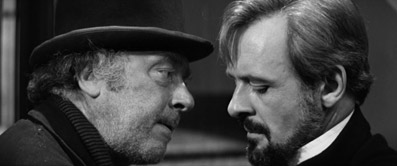
As might be expected from Victorian London, the chief exploiters are all male and it's left to the women to put things into their proper perspective. Treves' similarity to Bytes is brought home during a confrontation between the doctor and no-nonsense head nurse Mothershead, while it takes Treves' wife to point out that the difference between the manner in which the two men have exploited Merrick is one of quality of life – under Bytes he suffered silently, but under Treves he flourishes, relishing the human contact it affords him and the genuine kindness shown to him by others. Social and emotional opposites, Bytes and Treves function almost as alternate and opposing father figures, one abusive and restricting, the other kind and encouraging. Merrick's only relationship constant is, perhaps paradoxically, his absent mother, whose picture he treasures and whose image is crucial to the film's emotional humdinger of an ending.
The performances are universally faultless. As Merrick, John Hurt may be unrecognisable under Christopher Tucker's extensive make-up, but he works small miracles of pathos with his body language and delivery, and is surrounded by a virtual pantheon of British acting talent of the time, including John Gielgud (Carr Gom), Freddie Jones (superb as Bytes), Wendy Hiller (Mothershead), Hannah Gordon (Mrs. Treves) and Michael Elphick (the Night Porter). Anne Bancroft may have have a casting advantage as the executive producer's wife, but she shines as stage star and social magnet Mrs Kendall (just watch those moments when her joy at meeting Merrick momentarily falters), and yes, that's a 14-year-old Dexter Fletcher as Bytes' boy. But the cream of the acting honours have to go to Anthony Hopkins, who is at the absolute top of his considerable game as Treves. He creates in him a sympathetic, utterly believable character with none of the distancing stuffiness so often associated with British period pieces, making every line and action a pleasure to watch, but in a manner that's always truthful to the character and tone of the film. There are so many moments to call on for example here, but a personal favourite has him caught trying to sneak a bowl of soup up to Merrick's room and incorporating a half-hearted attempt to conceal it as he walks. The sad astonishment on his face when first confronted with Merrick is movingly real and his sudden explosion of anger when confronting the Night Porter about Merrick's disappearance makes the hairs on my forearm dance every time.
The film is beautifully lit and photographed by Freddie Francis, shortlisted by Lynch for his Oscar-winning work on the 1960 Sons and Lovers and returning to cinematography in the late 70s after a number of years in the director's chair, often for British horror specialists Hammer and Amicus. Working in black-and-white and scope, Francis creates a vivid sense of an authentic Victorian London (I speak of how it feels, for what real world experiences do any of us have for comparison?), but also captures the surrealistic elements of Lynch's visual bond with the time and place, from the smoke-belching industrial rooftops, long hospital corridors and bedraggled back alleys to the troubling imagery of Merrick's dream and the mesmerising opening sequence, in which the probably apocryphal story of a fateful encounter between Merrick's mother and an elephant is recreated with a nightmare precision worthy of Eraserhead's finest moments.
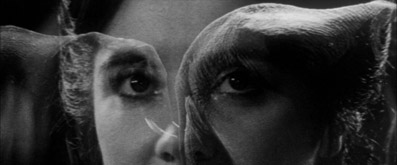
The Elephant Man also shares with Lynch's debut feature a soundtrack that is as carefully constructed as the imagery it accompanies, once again the work of Lynch's close collaborator, Alan R. Splet. Everything, from gas lamps to distant wind to the director's beloved rhythmic industrial machine workings, have been designed to enhance both the realism and surrealism of the setting and story, infusing even the ordinary with a sometimes disquieting but strikingly realised sense of the period and location. And when the emotional buttons are pushed, it's Mel Brooks regular John Morris's lovely, fairground-inspired score – with a little help from Samuel Barber – that transforms the moving into the genuinely heart-rending.
And then there's David Lynch. Eraserhead may have established him as a great film artist, but The Elephant Man proved that he could handle a dramatic narrative as well as the best of them and a damned sight better than most. His confidence is remarkable for a director in charge of his first major, industry-scheduled feature, working with Eric Bergren and Christopher De Vore to reshape their original screenplay and with his fellow filmmakers to develop it into a work of both dramatic power and artistic vision. He draws a string of superb performances from a cast whose reputation he was initially intimidated by, works with cinematographer Francis and regular sound designer Splet as if they are all in telepathic communication, and shapes every aspect of the drama like a craft veteran. And yet in spite of its structural conventions – at least in comparison to Eraserhead and much of the director's later work – it remains unmistakably a David Lynch film, in its texture, in its marriage of sound and imagery and in its unsettling surrealistic undertones.
I am, as you've probably realised by this point, somewhat partisan in regard to this film. I was stunned by my first encounter with it and even twenty-eight years and umpteen screenings later it still looks as fresh and accomplished and tonally unique as it ever did. And yes, that ending still had the tears rolling down my face, the experience heightened by my subsequent life experience and perhaps by the memory of those I have lost in the intervening years, including the man I sat and cried with at that second viewing. The Elephant Man is a work of humanist beauty, and while it may not be Lynch's most startling or original film, it remains his most emotionally affecting and one whose harmony of elements is as close to perfection as this viewer could wish for.
My expectation, I have to admit, was that the transfer on this new Optimum disc would be a re-issue of the one on Momentum's 2001 'Director's Chair' edition, but the start-of-film logo suggests that the transfer here has been licensed from the 2006 Studio Canal French release. The differences between the Studio Canal/Optimum and the earlier Momentum disc are clear and in places substantial. The newer transfer has clearly been remastered on a scene-by-scene basis in terms of its brightness and contrast, with darker scenes brightened and the contrast boosted, while in others the contrast has been toned down a little, resulting in subtler highlights and better shadow detail. In terms of image sharpness, however, Momentum's disc has the edge, the difference in some scenes (see the grabs below) being quite marked, although this appears to have been achieved in part through sometimes very noticeable edge enhancement. In other respects the transfer on the Optimum disc is a pleasing one that looks sharper in motion than the grab below suggests.
|
|
The grabs above are full sized extracts from the same sequence on both discs. The Momentum disc is clearly sharper, but at a price.
The frame grabs below illustrate some the differences between the original Momentum release (top in both cases) and the new Optimum release (bottom). The contrast and brightness have been tweaked; but not consistently or in every shot, and the ammount of information shown at the frame edges is different on both releases.
|
|
|
|
|
Although both are framed close to 2.40:1 and anamorphically enhanced, neither disc appears to have included the whole of the print image, with the Momentum transfer displaying more picture information on the left of frame and the Optimum transfer more on the right, something illustrated by the above frame grabs.
The Optimum disc upscales to HD well enough, but the sharpness does suffer a little without electronic help and shadow detail suffers in higher contrast shots. The Momentum disc looks sharper, but the enhancement issues are seriously magnified, particularly the digital grain on areas of light single colour. In this respect the Optimum wins out.
No remix has been undertaken for this re-issue, and unless Lynch himself were involved I'm happy to see things left as they are. What we do have is a clear and clean stereo track with the odd bit of excellent separation – the water heard running in the alleyway leading to Bytes' lodgings is located so far to the right of the sound stage that I was momentarily convinced I had a leak in my roof.
If you stick the words 'Special Edition' on your re-release you'd better deliver the goods to justify it, at least if you're going to re-sell the title to those who already own it. Optimum's disc certainly improves on Momentum's film-and-trailer-only release, but not by as much as the Special Edition badge might suggest. Nonetheless, the three main inclusions here are all worthwhile, though are likely to be of more value to newcomers to the film than old hands.
Joseph Merrick: The Real Elephant Man (19:57)
Jonathan Evans, curator of the Royal London Hospital archive, outlines the true story of Joseph Merrick, Joseph being Merrick's real first name, having been changed to John in error by Frederick Treves in his book The Elephant Man and Other Reminiscences, on which Bregren and De Vore's screenplay was partly based. A thorough and interesting introduction, complete with archive photographs and extracts from the film, which Evans clearly admires in spte of its deviations from the facts, which are usefully highlighted here along with elements it gets just right.
John Hurt Interview (20:14)
Hurt looks back at the making of the film and recalls working with Lynch, his admiration for Hopkins and initial terror of Gielgud, the difficulty of one particular location shoot and his approach to playing Merrick.
David Lynch Interview (24:50)
Engaging as ever, Lynch outlines in some detail how he became involved with the project, including the oft-repeated (but still engaging) stories of how Mel Brooks reacted to Eraserhead and why Chris Tucker was brought on board to do the Elephant Man makeup. The selection of Freddie Francis, Lynch's love of the now lost Victorian London locations and his passion for real French fries are also covered, and he rounds off the interview with a proclamation that he will never work on film again, so sold is he now on digital.
Theatrical Trailer (3:06)
A good condition scope anamorphic trailer that plays on Merrick's appearance and Tucker's makeup by omission, refusing to give you even a glimpse of it.
Following Eraserhead was always going to be a challenge and a half, and as someone who fell in love with Lynch's debut film I initially approached The Elephant Man with just a little trepidation. I wanted Lynch the experimental film artist, the nightmare surrealist, not Lynch the historical drama director. Oh how wrong I was. The Elephant Man is a uniquely marvellous work and one that has not dated one iota since its release. For some it's even their favourite Lynch film, and I would certainly suggest that, along with The Straight Story, it's also his most instantly accessible.
As for Optimum's Special Edition DVD, well if you don't already own the film then it's the one to go for and if you're new to it the extra features provide a good deal of useful background detail on the production. The transfer is good but still a little short of what the film deserves. We can only hope that a later blu-ray will put this right.
|